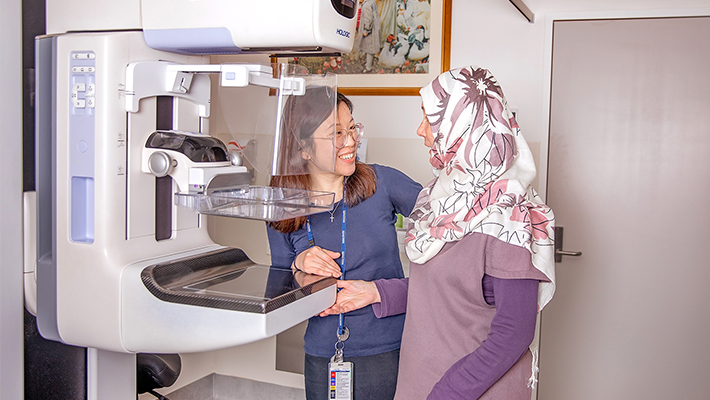Australia now has a roadmap towards improved early detection of breast cancer, with the launch of a landmark Commonwealth-funded report led by a research team from the Daffodil Centre, a joint venture between Cancer Council NSW and the University of Sydney.
The Roadmap to Optimising Screening in Australia (ROSA – Breast) summary report maps a path towards improved breast cancer screening outcomes, with key recommendations including trials to test new technologies, improved data linkage, evolving clinical guidelines, and targeted research.
The report, funded by the Australian Department of Health and Aged Care through a grant to Cancer Council Australia, summarises five years of independent evidence review, stakeholder consultation, landscape analyses, and modelling focused on longer-term structural opportunities to improve breast cancer outcomes.
The Hon. Mark Butler MP, Minister for Health and Aged Care, commended the work in “generating the evidence base to inform the future of breast cancer screening.”

Professor Bruce Mann, specialist breast surgeon and director of the Breast Tumour Stream at the Victorian Comprehensive Cancer Centre, who co-chaired the two expert groups advising the project since its inception in 2018, said improved access to optimal screening and diagnostic technology would be key to improving outcomes.
“Although Australia has good outcomes by international standards, breast cancer is still the second-leading cause of cancer death in women,” Professor Mann said.
“Most of these deaths are in women diagnosed at later stage. We urgently need a plan to inform the system changes needed to find more cancers at earlier stage, and do it in a consistent, evidence-based way.
“The ROSA report sets out that plan. The priority now will be continued engagement with key stakeholders to put it into practice.”

Associate Professor Carolyn Nickson, head of the Daffodil Centre’s Breast Cancer Policy and Evaluation stream and ROSA science lead, said the report provided a framework to improve on Australia’s strong record in breast cancer outcomes and “ensure progress is evidence-based, consultative, and multisectoral”.
“Australia has a breast screening program that is rightly considered to be among the best in the world, with reduced breast cancer mortality rates among participants estimated at between 41 and 52 percent,” Associate Professor Nickson said.
“Daffodil Centre research published last year nonetheless shows that unless something changes, around 90,000 Australian women will die of breast cancer over the next two decades, most of them women diagnosed at late stage.
“Community and commercial interest in breast screening innovation has increased a lot in recent years as technology and evidence on the role of complex risk factors have evolved.
“Our advice to the Australian Government was to capture that interest and evidence in a rigorous scientific framework, independent of commercial interests and guided by key stakeholders including clinicians from multiple disciplines, consumers, and policy experts.
“We greatly appreciate the Australian Government’s leadership in commissioning the ROSA project. We’ve used this opportunity to pull together the best available evidence and stakeholder insights to help pave the way for meaningful improvements in breast cancer screening in Australia.
“There is still more to do before we have strong enough evidence and the workforce required to implement systematic changes to breast screening and follow-up services. We have set out a roadmap that will take us there. It will require the same consultative, evidence-based approach that underpinned its development.
“With effective leadership, resourcing, and coordination across health services and the academic sector, Australia is well-positioned to make this vision a reality.”
ROSA report – key recommendations in summary
- Revise policies and develop guidelines designed to adapt to evidence/technological changes and promote greater national consistency in the management of women with different levels of breast cancer risk, within and external to BreastScreen.
- Conduct new studies in Australian screening settings including careful evaluation of breast density and breast cancer risk assessment tools and trials to assess the targeted use of digital tomosynthesis, ultrasound, MRI, and contrast-enhanced mammography for risk-stratified women.
- Monitor international clinical trials and related evidence to adapt to Australian implementation studies and trials.
- Develop a national framework for data collection and linkages designed to inform and monitor potential long-term changes in screening policy and practice, including options for systematically screening women aged 40-49 years.
- Enhance reporting on outcomes for under-screened populations (e.g., Indigenous, rural/remote, culturally diverse, low income) to help ensure any policy changes do not widen gaps in screening outcomes by population group.
- Expand stakeholder engagement in promoting the recommendations, to ensure optimal stakeholder consultation underpins the roadmap’s implementation.
More information about the ROSA project is on the Cancer Council Australia website.




